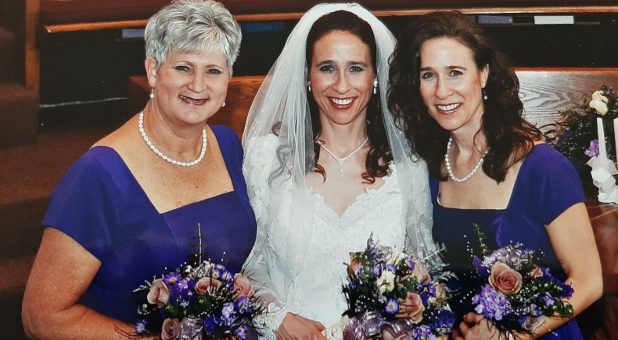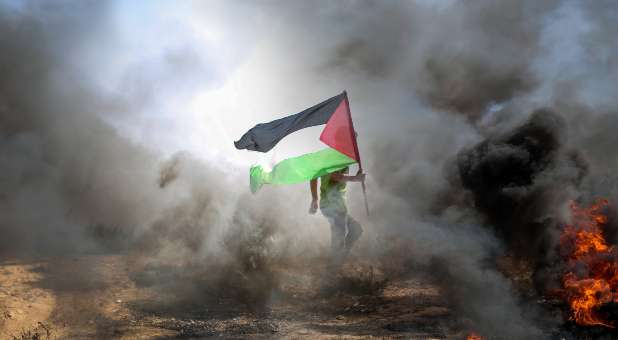I met Kristine Luken posthumously. She and a mutual friend, Kay Wilson, were victims of an unspeakable terror attack in Israel in December 2010. Miraculously, Kay survived. I became so close to Kristine that upon meeting her twin sister Kathleen, I felt as if I was meeting not only the sister of an old friend, but having a reunion with an old friend, even though we had never met.
I’ve written about Kristine and her murder, and championed campaigns to memorialize her. Part of this is out of natural compassion for any victim of such an unspeakable terrorist crime. Part is because I feel an extra obligation regarding Kristine and her family. Why? Because as Americans and Christians, they are not naturally enveloped in the sense of community as are other families of victims, nor are they remembered per se when Israel observes Yom Hazikaron, Memorial Day, when Israel remembers both its nearly 25,000 fallen soldiers and terror victims.
Kathleen and I have shared deep thoughts about Kristine, their faith, the terrorists, forgiveness, grief and more. When an American Jew is murdered in Israel, as has happened multiple times, if they come from communities that observe Yom Hazikaron, there is a loving embrace of the survivors as of one of their own. Arguably, when a diaspora Jew is murdered in a terror attack, the extended community from which they came becomes more aware of the need to memorialize the tens of thousands of victims, and comfort their families.
Not so with non-Jews, even in the case of those like Kristine, whose lives were centered on love for God, for Israel and for the Jewish people. Being outside Israel and a formal Jewish community, families like Kristine’s are excluded. Not willingly, just circumstantially. With Memorial Day in the U.S. being more of a holiday weekend than a day that significantly serves to remember even those lost in the military, they are left alone.
Mourning Alone
I asked Kathleen how she feels about that. “Unfortunately, I have not met anyone who has lost a loved one to terrorism. I had longed for many years to do so. I had searched to find someone who could understand and relate (to my loss), hoping they could help me navigate these unchartered waters.”
Jewish mourning is based on a centuries-old tradition where one buries the deceased as soon as possible, then comforts the survivors. Part of this is done by talking about the deceased, remembering and reflecting on his/her life. Being outside any community that embraces this routinely, Kathleen also realizes that she’s missing something.
“My grief has been extremely private with no public acknowledgement except the memorial service where I was in shock and [barely] begun the long journey of grief,” she said. “The world would benefit by understanding the Jewish tradition of mourning.
“In Western culture, grief is [typically) private. Sadly, you’re expected to ‘get over it’ and move on. You don’t ‘get over’ grief just like you don’t stop missing someone and remembering them. Rather, you learn painfully and slowly through a very difficult and lonely process to accept the loss and then choose with an act of the will to live and carry on with life. For me, this is inextricably linked to my faith in God and Jesus Christ. [In Judaism] you are taught to acknowledge those lost, and to grieve without judgment. Jewish tradition calls you to remember, to do so routinely, and even publicly. This helps you to grieve and practice the gift of remembering, bringing it into the warmth of shared public grief. Community.”
Does the church or organized Christian world provide a structure to help with grieving?
“Western culture, to our own fault, expects grievers to put on a happy face,” Kathleen said. “[You need to get] back to work and to ‘look’ like you are OK. I dare say the desire is to have you move on because ‘they’ feel uncomfortable with loss. While this sounds like an inditement I do believe it is justified. Unfortunately, the ‘church’ is also guilty of not embracing those of its own who have lost a loved one and helping them grieve by walking along side, lacking a rich tradition.”
Invoking a New Testament teaching Kathleen suggests that the church must practice “weeping with those who weep” (Rom. 12:15).
Unlike Memorial Day in the U.S., where few know anyone who was killed in service, with nearly 25,000 victims in Israel who are mourned over the decades, nearly all Israelis have been touched. It’s said in Israel that everyone knows someone, or knows someone who knows someone, who has been lost to war or terror. This creates a sense of community, communal responsibility and awareness that Kathleen didn’t have when Kristine was murdered.
“My grief circle was limited. It was such a lonely experience on top of unmeasurable grief,” she said. “I was newly married and my husband was thrown into the throes of tragedy of monumental proportions. My husband stayed steady and was an anchor as I wrestled with God, struggled, wept and expressed my anger at God.
“There were some friends who provided comfort. Many didn’t know how to ‘be there’ for me and wanted me to let them know if I needed anything. I couldn’t articulate what I needed, and didn’t have the wherewithal to ask. Susanne, a dear friend, and her daughter, Naomi, who had never met me, served our family at Kristine’s Memorial Service. She wept with me from afar through letters. She listened to my anguish, helping process my grief, my questions and railings at God as I accused Him of not loving Kristine.
“She gently carried my heart and laid it at Jesus’ feet and loved me, prayed for me and stayed by my side. She was my ‘John’ at the cross of my grief. John, the one whom Jesus loved, stood at the cross at Jesus’ crucifixion and grieved and mourned as Jesus was crucified. John the disciple stayed. While we have no record of any words he may have spoken to Jesus, his presence spoke loudly as he quietly and faithfully testified courageously of his love and commitment to the One he loved, Jesus.
“Susanne was at my cross of grief as it were, loving and caring for me. I only recently learned of this concept from Pastor Steven Furtick and what a beautiful picture. He pleaded with his congregation to not overlook the ‘John’ at their cross because a particular person was not there. I bemoaned those who did not come or stay at my cross as it were and overlooked those who did. This teaching was freeing as I chose to release those I so wanted to be at my cross but could not, as I overlooked those precious ones who were.
“My prayer is that God will use my grief, all my struggles and pain, to help others and glorify and testify to God’s unfailing love as He says in 2 Corinthians 1:3-4, ‘Blessed be the God and Father of our Lord Jesus Christ, the Father of sympathy and the God of every comfort Who comforts us in every trouble, so that we may also be able to comfort those who are in any kind of trouble with the comfort with which we ourselves are comforted by God.'”
Stay tuned for Part 2 tomorrow.
See an error in this article?
To contact us or to submit an article






















